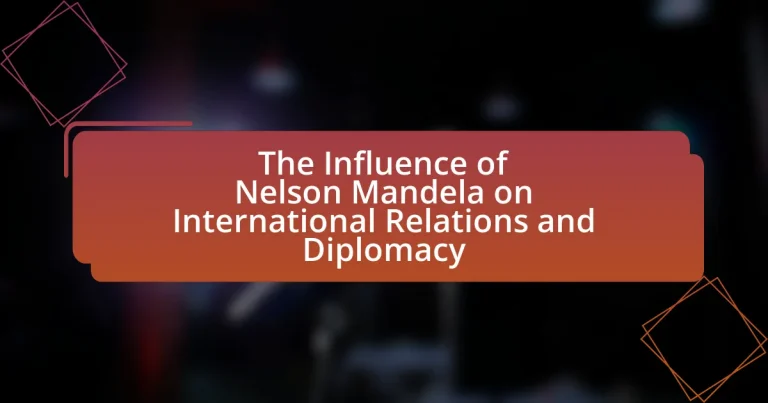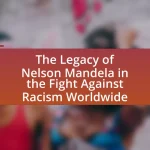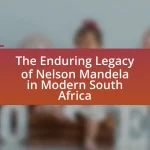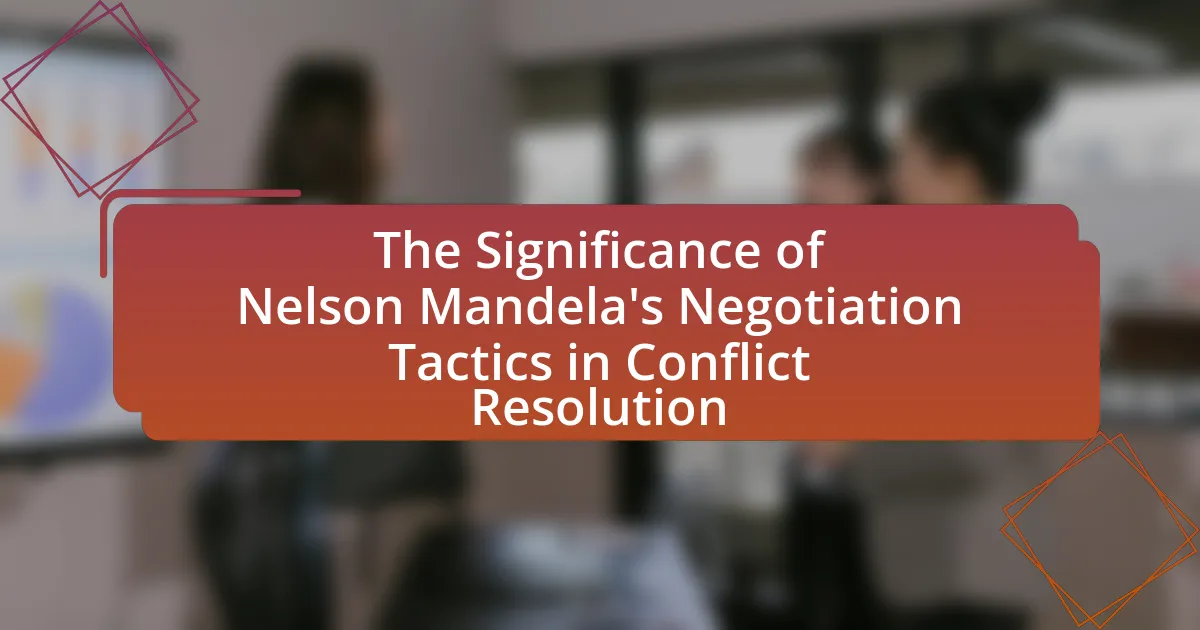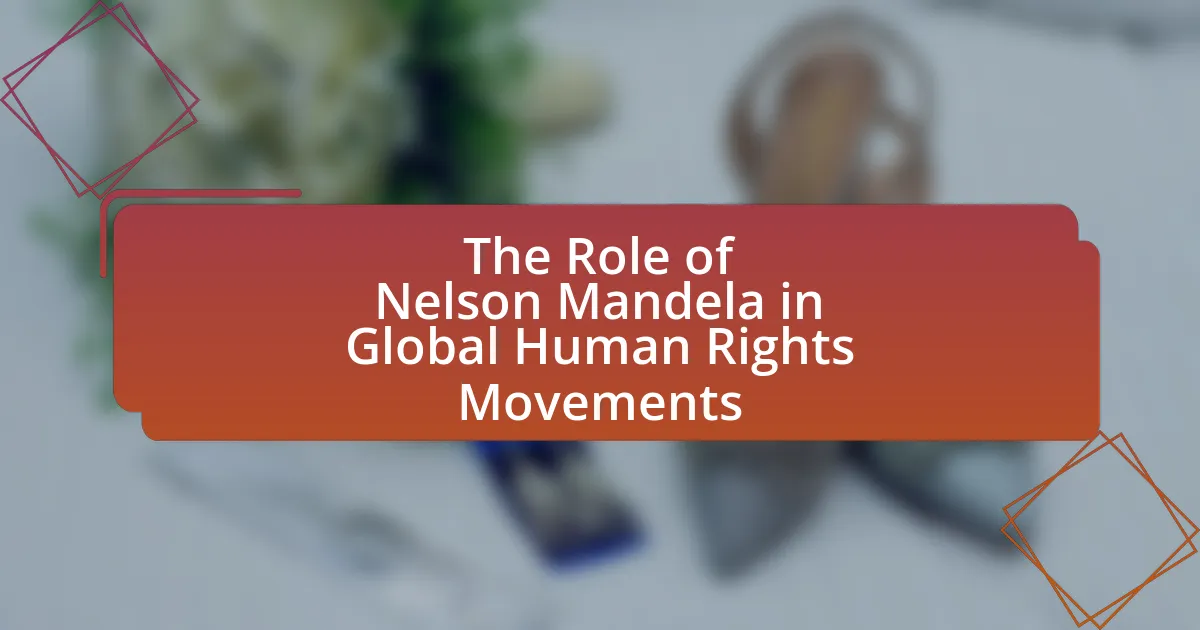Nelson Mandela is a pivotal figure in the realm of international relations and diplomacy, known for his promotion of peace, reconciliation, and human rights. His leadership during the anti-apartheid movement and his presidency in South Africa exemplified the effectiveness of negotiation over conflict, influencing global perspectives on equality and justice. The article explores how Mandela’s early life experiences shaped his views on international relations, the alliances he forged during the anti-apartheid struggle, and the diplomatic strategies he employed to enhance South Africa’s international standing. Additionally, it examines the lasting impact of his legacy on contemporary diplomacy and the lessons that can be drawn from his approach to conflict resolution and global cooperation.
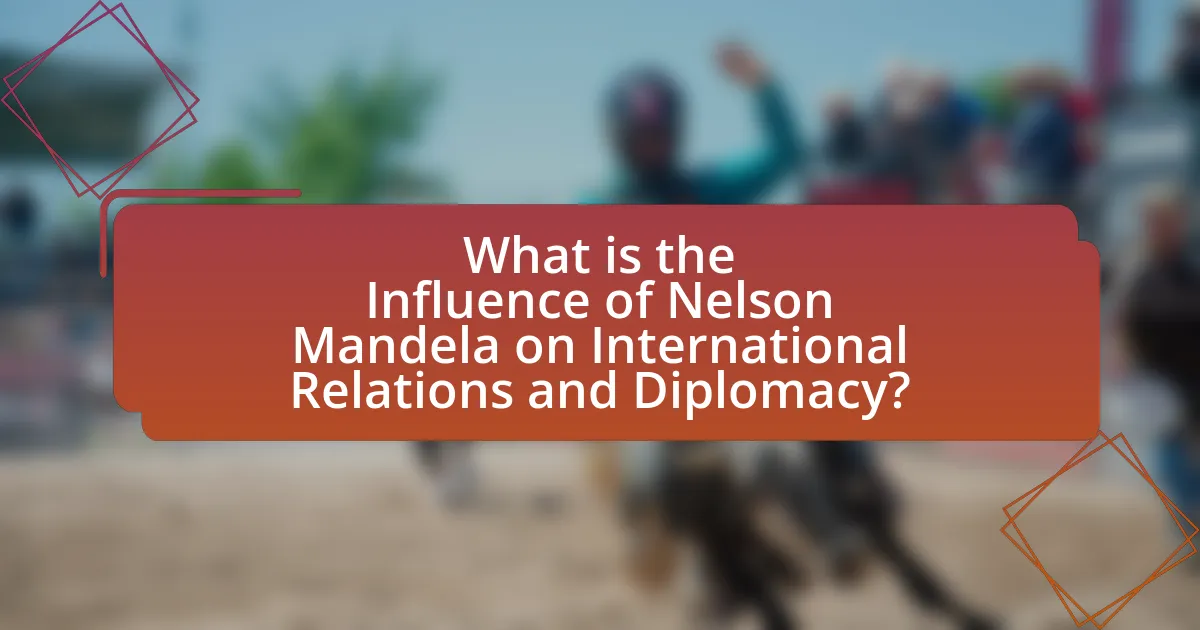
What is the Influence of Nelson Mandela on International Relations and Diplomacy?
Nelson Mandela significantly influenced international relations and diplomacy by promoting peace, reconciliation, and human rights on a global scale. His leadership in the anti-apartheid movement and subsequent presidency in South Africa showcased the power of negotiation over conflict, exemplified by his willingness to engage with former adversaries, which helped to dismantle apartheid peacefully. Mandela’s advocacy for human rights and social justice resonated worldwide, leading to increased international pressure on oppressive regimes and fostering a global dialogue on equality and freedom. His efforts earned him the Nobel Peace Prize in 1993, further solidifying his impact on diplomatic efforts aimed at conflict resolution and the promotion of democratic values.
How did Nelson Mandela’s early life shape his views on international relations?
Nelson Mandela’s early life significantly shaped his views on international relations through his experiences with racial injustice and colonialism in South Africa. Growing up in the rural village of Mvezo, Mandela witnessed the systemic oppression of black South Africans under apartheid, which instilled in him a deep understanding of the struggles against colonial powers. His education at the University of Fort Hare exposed him to African nationalism and the global fight for civil rights, further influencing his perspective on the interconnectedness of liberation movements worldwide. Mandela’s involvement in the African National Congress (ANC) and his exposure to international solidarity efforts, such as support from countries like India and the Soviet Union, reinforced his belief in the importance of global alliances in combating oppression. These formative experiences laid the groundwork for his later advocacy for a multilateral approach to diplomacy, emphasizing human rights and equality on the international stage.
What experiences influenced Mandela’s perspective on global diplomacy?
Nelson Mandela’s perspective on global diplomacy was significantly influenced by his experiences during the anti-apartheid struggle, his imprisonment, and his subsequent role as South Africa’s first black president. The anti-apartheid movement exposed Mandela to international solidarity and the importance of global alliances, as he witnessed how global pressure contributed to the end of apartheid. His 27 years in prison fostered a deep understanding of human rights and the necessity of dialogue, as he recognized that negotiation was essential for peace and reconciliation. Upon becoming president, Mandela emphasized diplomacy over conflict, advocating for peaceful resolutions and cooperation, which was evident in his efforts to mediate conflicts in Africa and promote human rights globally. These experiences collectively shaped his belief in the power of diplomacy as a tool for achieving justice and fostering international cooperation.
How did apartheid impact Mandela’s approach to international relations?
Apartheid significantly shaped Nelson Mandela’s approach to international relations by instilling a strong commitment to human rights and global solidarity against oppression. Mandela recognized that the struggle against apartheid was not only a national issue but also a global concern, leading him to advocate for international sanctions and isolation of the apartheid regime. His experiences during imprisonment and the global anti-apartheid movement highlighted the importance of international alliances, prompting him to prioritize diplomacy and multilateralism in his post-presidency efforts. Mandela’s leadership in the African National Congress and his subsequent presidency emphasized the need for cooperation among nations to address social justice, as evidenced by his active participation in organizations like the African Union and his promotion of peace initiatives worldwide.
What role did Mandela play in the anti-apartheid movement on a global scale?
Nelson Mandela played a pivotal role in the anti-apartheid movement on a global scale by becoming a symbol of resistance against racial oppression and advocating for human rights. His imprisonment from 1962 to 1990 drew international attention to the injustices of apartheid, leading to widespread global campaigns for his release and sanctions against the South African government. Mandela’s leadership in the African National Congress (ANC) and his ability to unite various factions within the anti-apartheid struggle galvanized support from countries and organizations worldwide, including the United Nations, which imposed an arms embargo on South Africa in 1977. His eventual release and subsequent election as South Africa’s first Black president in 1994 marked a significant turning point, inspiring global movements for justice and equality.
How did Mandela’s activism influence international perceptions of South Africa?
Mandela’s activism significantly transformed international perceptions of South Africa by highlighting the country’s struggle against apartheid and promoting human rights. His leadership in the anti-apartheid movement garnered global attention, leading to widespread condemnation of the South African government and increased international pressure for change. For instance, Mandela’s imprisonment became a symbol of resistance, inspiring global campaigns such as the “Free Nelson Mandela” movement, which mobilized millions and resulted in economic sanctions against South Africa. This activism not only shifted public opinion worldwide but also facilitated South Africa’s eventual transition to a democratic society, altering its global standing from a pariah state to a respected member of the international community.
What alliances did Mandela forge with other nations during the struggle against apartheid?
Nelson Mandela forged significant alliances with various nations during the struggle against apartheid, notably with countries like the Soviet Union, Cuba, and several African nations. These alliances were crucial in garnering international support against the apartheid regime. For instance, the Soviet Union provided military training and support to the African National Congress (ANC), while Cuba sent troops to assist in the liberation movements in Southern Africa. Additionally, Mandela’s relationships with other African nations, such as Tanzania and Zambia, facilitated the establishment of bases for ANC operations and helped in mobilizing regional support against apartheid. These alliances not only strengthened the ANC’s position but also highlighted the global condemnation of apartheid, leading to increased sanctions and diplomatic pressure on South Africa.
How did Mandela’s presidency affect South Africa’s foreign policy?
Mandela’s presidency significantly transformed South Africa’s foreign policy by prioritizing human rights and multilateralism. Under his leadership from 1994 to 1999, South Africa re-engaged with the international community, moving away from the isolationist stance of the apartheid era. Mandela emphasized the importance of diplomacy and cooperation, which led to South Africa’s active participation in organizations like the African Union and the United Nations. His administration also championed the African Renaissance, promoting economic development and political stability across the continent. This shift was evident when South Africa played a crucial role in mediating conflicts in countries such as Burundi and the Democratic Republic of Congo, showcasing its commitment to peace and security in Africa.
What diplomatic strategies did Mandela employ to improve South Africa’s international standing?
Nelson Mandela employed several diplomatic strategies to improve South Africa’s international standing, primarily through reconciliation, multilateral engagement, and promoting human rights. Mandela’s focus on reconciliation aimed to unite a divided nation and foster goodwill, which he showcased by inviting former adversaries to participate in the new democratic government. His commitment to multilateral engagement was evident when he actively participated in international organizations, such as the United Nations, and sought to strengthen ties with other nations, particularly in Africa, to promote regional stability. Additionally, Mandela championed human rights on the global stage, leveraging South Africa’s transition from apartheid to advocate for the rights of oppressed peoples worldwide, thereby enhancing South Africa’s reputation as a moral leader. These strategies collectively contributed to a significant improvement in South Africa’s international standing post-apartheid.
How did Mandela’s leadership influence South Africa’s relationships with other African nations?
Mandela’s leadership significantly improved South Africa’s relationships with other African nations by promoting a policy of reconciliation and solidarity. His commitment to pan-Africanism and support for liberation movements across the continent fostered a sense of unity among African countries. For instance, Mandela’s government actively engaged in diplomatic efforts to resolve conflicts in countries like Angola and Mozambique, which enhanced South Africa’s standing as a leader in regional stability. Additionally, Mandela’s participation in the African Union and his advocacy for African solutions to African problems solidified South Africa’s role as a key player in continental affairs, further strengthening ties with neighboring nations.
What are the key principles of Mandela’s approach to diplomacy?
Nelson Mandela’s approach to diplomacy is characterized by key principles such as reconciliation, dialogue, and respect for human rights. Reconciliation was central to Mandela’s efforts in post-apartheid South Africa, as he sought to unite a divided nation through inclusive dialogue rather than retribution. His emphasis on dialogue is evident in his willingness to engage with former adversaries, fostering understanding and cooperation. Additionally, Mandela’s commitment to human rights shaped his diplomatic engagements, advocating for justice and equality on a global scale, as seen in his support for various liberation movements and his stance against oppression. These principles not only guided his domestic policies but also influenced international relations, promoting peace and collaboration worldwide.
How did Mandela promote reconciliation and peace in international relations?
Nelson Mandela promoted reconciliation and peace in international relations through his advocacy for dialogue, forgiveness, and mutual respect among nations. He emphasized the importance of understanding and addressing historical grievances, as seen in his efforts to dismantle apartheid and foster a new democratic South Africa, which served as a model for conflict resolution globally. Mandela’s leadership in the establishment of the Truth and Reconciliation Commission in 1995 exemplified his commitment to healing and unity, encouraging nations to confront their pasts rather than perpetuate cycles of violence. His international diplomacy included fostering relationships with countries across the globe, promoting human rights, and supporting peace initiatives, such as his involvement in mediating conflicts in Africa. These actions collectively reinforced his legacy as a champion of peace and reconciliation on the world stage.
What lessons can be learned from Mandela’s diplomatic style?
Nelson Mandela’s diplomatic style teaches the importance of reconciliation and negotiation in conflict resolution. His approach emphasized dialogue over confrontation, as seen in his efforts to unite a divided South Africa post-apartheid, where he prioritized building relationships with former adversaries. Mandela’s ability to forgive and include diverse perspectives fostered a collaborative environment, which is evident in the establishment of the Truth and Reconciliation Commission. This commission aimed to address past injustices while promoting healing, demonstrating that diplomacy can be effective when it seeks to understand and integrate differing viewpoints.
How did Mandela’s legacy continue to influence international relations after his presidency?
Mandela’s legacy continued to influence international relations after his presidency by promoting principles of reconciliation, human rights, and social justice globally. His approach to diplomacy emphasized dialogue over conflict, which inspired numerous peace processes, such as those in Colombia and the Philippines, where leaders sought to resolve long-standing conflicts through negotiation. Furthermore, Mandela’s advocacy for the African Renaissance and Pan-Africanism encouraged African nations to collaborate on economic and political issues, leading to initiatives like the African Union. His moral authority and commitment to equality also shaped international norms, as seen in the global anti-apartheid movement, which galvanized support for human rights initiatives worldwide.
What initiatives have been inspired by Mandela’s vision for global diplomacy?
Mandela’s vision for global diplomacy has inspired several initiatives, including the establishment of the Nelson Mandela Foundation, which promotes peace, reconciliation, and social justice. This foundation works to address issues such as poverty and inequality, reflecting Mandela’s commitment to human rights and global cooperation. Additionally, the African Union’s Agenda 2063, which aims for a prosperous and united Africa, draws on Mandela’s ideals of unity and collaboration among nations. These initiatives are concrete manifestations of Mandela’s influence, emphasizing diplomacy rooted in dialogue, respect, and mutual understanding.
How do contemporary leaders reference Mandela’s influence in their diplomatic efforts?
Contemporary leaders reference Nelson Mandela’s influence in their diplomatic efforts by emphasizing his principles of reconciliation, forgiveness, and human rights. For instance, leaders like Barack Obama and Justin Trudeau have cited Mandela’s legacy as a guiding force in promoting peace and social justice in their foreign policies. They highlight Mandela’s ability to unite a divided nation and advocate for dialogue over conflict, which serves as a model for resolving international disputes. Additionally, Mandela’s emphasis on equality and dignity for all people resonates in contemporary discussions on global human rights, influencing leaders to adopt similar stances in their diplomatic engagements.
What practical lessons can be drawn from Mandela’s influence on international relations and diplomacy?
Nelson Mandela’s influence on international relations and diplomacy teaches the importance of reconciliation and dialogue in resolving conflicts. His approach emphasized the need for understanding and cooperation over confrontation, as demonstrated during the transition from apartheid to a democratic South Africa, where he advocated for peaceful negotiations with former adversaries. This strategy not only facilitated a peaceful transition but also garnered international support, showcasing how diplomacy rooted in empathy can lead to sustainable solutions. Mandela’s legacy illustrates that fostering relationships based on mutual respect and shared goals can effectively address global challenges, as seen in his efforts to promote peace in various African nations and his role in the establishment of the African Union.
